Instead of echoing Trump’s themes, the democratic presidential contenders should explain how they will prevail in America’s multifaceted competition with China, argues Thomas Wright. This piece originally appeared in The Atlantic.
As the 2020 presidential campaign gets under way, Democrats are beginning to think about what type of foreign-policy message they need to defeat President Donald Trump. A recent conference organized by National Security Action, a progressive group run by former Obama-administration officials, unveiled an early consensus—Democrats will promise to intervene less abroad, refocus on strengthening America at home, and work with others on shared problems, such as climate change. The first two elements have been part of the core message of the four people to win the presidency over the past quarter century.
Advisers to the Democratic presidential campaigns expect intense fights over a small number of issues—such as Israel, which pits younger progressives against the party’s traditional position—but otherwise they believe that the candidates will generally agree on foreign policy, and focus instead on domestic matters. Most will make carefully crafted set-piece speeches on foreign policy, but it will not be a part of their stump speech.
There is a clear logic to the emerging consensus, but it may not be enough. The messages that worked for Bill Clinton, George W. Bush, Barack Obama, and Donald Trump are unlikely to work to dislodge Trump. If Democrats want to beat Trump on foreign policy, they need to place competition with China at the heart of their pitch to voters.
On military intervention, Democrats could find themselves scooped by the president. He is undoubtedly reckless and militaristic, but he also seems acutely aware of the risks of large-scale military action. He recently publicly rebuked John Bolton, his national-security adviser, for pushing for military intervention in Iran, North Korea, and Venezuela. Trump’s militarism could see the United States embroiled in a war between now and the election, but there is a strong possibility that he will avoid one. Yes, the United States remains involved in Afghanistan and Syria, but Trump wants to pull out of both conflicts and may ultimately insist on it as the election looms.
The argument that Americans must pivot to the home front may fare no better. This has been Trump’s mantra for years. The results of his renegotiations of trade deals may be poor, and he has not fulfilled his promise to invest in infrastructure, but he has already made the rhetoric that the Democrats are trying to adopt his own. Moreover, he may be able to tell many voters that he’s succeeded. The present economic boom started under Obama, but it doesn’t really matter—if it extends through next November, voters will credit Trump. And, as David Gordon of the Eurasia Group observes, the states Trump won in 2016, including many that suffered during the Great Recession, are experiencing higher levels of job growth than the rest of the country.
That leaves Democrats with international cooperation as their best hope of distinguishing their foreign-policy message from Trump’s. But a recent study of public opinion by the Center for American Progress found that this will prove a tough sell:
“Language from foreign policy experts about ‘fighting authoritarianism and dictatorship,’ ‘promoting democracy,’ or ‘working with allies and the international community’ uniformly fell flat with voters in our groups. Some participants questioned the idea that an international community actually exists. Democracy promotion reminded others of the 2003 Iraq War and the failures of the George W. Bush administration. When asked what the phrase ‘maintaining the liberal international order’ indicated to them, all but one of the participants in our focus groups drew a blank. Voters across educational lines simply did not understand what any of these phrases and ideas meant or implied.”
The inconvenient truth for the Democratic field is that Trump’s crude foreign-policy message could resonate in 2020. He promises to remove constraints and use power freely, including against America’s friends, to extract more economic benefits. The benefits may be smaller than advertised. His approach may come at the cost of eroding America’s global influence and replacing the rules-based international order with something temporary, fragile, and transactional. He may be even more radical in his second term. Trump’s presidency may dramatically increase the risk of a national-security catastrophe—character is fate. But, until the catastrophe actually arrives, Trump is unlikely to be hurt politically. Many voters are only too pleased to have a president willing to shake things up internationally.
The Democratic candidates need to ask themselves a fundamental question: Is the minimalist foreign-policy message that has been used repeatedly since 1992 appropriate for a moment defined by political and technological upheaval around the world? Is there an opportunity for a candidate to offer a more comprehensive message about why Trump is failing abroad and how it matters to Americans in their daily lives?
As long as he avoids war and recession, Trump’s political Achilles’ heel is not his aggressiveness or ignorance, but his focus on the past, not the future. He is obsessed with the industries of the 1950s—steel, aluminum, cars, and dishwashers—and never speaks about the industries of tomorrow. He talks about the unfairness of old security commitments but never about how the United States must work with others on the challenges of the future. He never even mentions the central message of his administration’s own national-security strategy, that the United States is in a new great-power competition that supersedes terrorism and rogue states.
The problem is that, on foreign policy, many Democrats are also stuck in the past. They talk about the liberal order from the 1940s, NATO’s shared past, territorial disputes that date back decades, and an intervention debate that began in the 1990s. But voters don’t want to embrace the past or abstractions. They care how the world challenges their lives and those of their children, not just now but also in the years to come. Americans have always been motivated by threats and challenges to liberty and prosperity at home, rather than grand projects to promote democracy. This was even true of the liberal order itself—Americans rejected the project in 1945 and 1946, only turning to it as a necessary tool to confront communism.
The challenge for the Democratic candidates is to connect all the issues, domestic and foreign, into a larger narrative that relates to Americans’ daily lives, illuminates the future, and offers a path forward. The most likely way to do this is to say that the United States is losing a vitally important competition with China because the president is obsessed with the past and ignorant about the future. China is the one thing that connects all other things. It directly affects the economy, the financial system, technological innovation, values, and national security. As the Center for American Progress study showed, it is the only foreign-policy issue, other than terrorism, that voters really care about—not because they seek conflict, but because they worry about falling behind.
The United States is in a multifaceted competition with China. This is unlikely to involve military conflict, although there is a military dimension to it. The competition is technological, economic, political, diplomatic, and ideological. It is particularly complicated by the fact that the United States and China are interdependent and need to cooperate with each other even as they compete. The president styles himself as tough on China, but as Ely Ratner, director of studies at the Center for a New American Security, put it, Trump is “confrontational but not competitive.” Many of his actions are counterproductive and irresponsible. And in some areas of the competition, such as the clash between the free world and autocracy, Trump is on the wrong side.
Putting competition with China at the center of their foreign policy would allow Democrats to make the case for modernization and investment in crucial sectors, most notably in technology, which is becoming the competition’s center of gravity. The conventional wisdom is that the United States is destined to out-innovate China, because open systems beat closed systems. But what was true in the past with nuclear power, the microchip, and the internet may not apply to artificial intelligence, where access to data could give authoritarians an edge.
On 5G, the next generation of wireless-networking technology, China has shown itself to be particularly adept, successfully leveraging Huawei’s position to remove competitors from the field through subsidies and to undercut them on price. Unlike John F. Kennedy’s missile gap, the technology gap is real in key sectors. Presidents Obama and Trump were slow to recognize the problem. And now, the Trump administration is proposing to slash the budget for the very programs and agencies that make America competitive, such as the National Science Foundation and the Department of Education.
Technology is not just an industrial question. It also affects values. The way that China and other authoritarian governments are using facial recognition, surveillance, and social-credit scores to consolidate their control, and social media and artificial intelligence to interfere in democracies, raises profound questions for Americans. Voters don’t necessarily want to promote democracy, but they do want to defend it.
Trump likes to complain that America’s allies take advantage of the United States, yet he has repeatedly rejected the European Union’s offer to work together to make China play fair in the global economy, dismissing the EU as worse than China. He has demonized Germany and its chancellor, Angela Merkel. Relations with the United Kingdom are at their lowest point since the Suez crisis of 1956. Meanwhile, Trump cozies up to truly problematic allies, such as Viktor Orbán, Hungary’s wannabe strongman who champions “illiberal democracy” and flirts openly with the China option as well as with Russia. Trump hosted Orbán on Monday. The minimalist playbook, which the Democratic field has so far followed, is to ignore that visit or to tweet disapproval. A bolder approach would have been to flip the script on Trump by pointing out that Orbán is taking advantage of his alliance with America, and to question whether Hungary can remain a U.S. ally if its troublesome trajectory continues unabated.
The Trump campaign believes that China can be a winning issue in the 2020 campaign. It is already leaping on Joe Biden’s off-the-cuff remark that China “isn’t in competition with us.” But a few months ago, at the Munich Security Conference, Biden also said that China “seeks to establish itself as a hegemon and a global power player” and that the United States finds itself in “an ideological struggle … a competition of systems [and] a competition of values” with Beijing and other authoritarian powers. Bernie Sanders and Elizabeth Warren have both highlighted the risk posed by kleptocratic and autocratic regimes in their foreign-policy speeches, with Warren singling out China in particular.
But Democratic political strategists never want to talk about foreign policy, seeing it as a loser. Democratic foreign-policy experts generally agree that relations with China are becoming more difficult, but they are deeply divided about how much emphasis to place on it. Many accept the thrust of Trump’s official national-security document: that the United States finds itself in a new era of great-power competition. Their complaint is that Trump doesn’t believe a word of it, while his administration’s response is ineffective and counterproductive.
Other experts worry that the China challenge is over-cranked and in danger of spiraling out of control. That Kiron Skinner, the State Department’s director of policy planning, recently called it a clash of civilizations feeds this concern. These advisers are also keen not to break with Obama, who sought to avoid having his foreign policy defined by geopolitical competition. The skeptics are aligned with the consultants, and the result is minimalism. They hope they can tap into the competitive impulses by making a generic argument that the United States must be strong at home to be strong in the world, but without identifying the country’s main competitor, that argument loses its potency.
Yet with 22 candidates already in the race, a consensus will be hard to maintain. There is an incentive to think about new approaches that draw a stark contrast with Trump but also depart from the Obama administration. Democrats need a powerful foreign-policy message that connects with domestic politics. Competing responsibly and effectively with China is the best one they have.
The Brookings Institution is committed to quality, independence, and impact.
We are supported by a diverse array of funders. In line with our values and policies, each Brookings publication represents the sole views of its author(s).


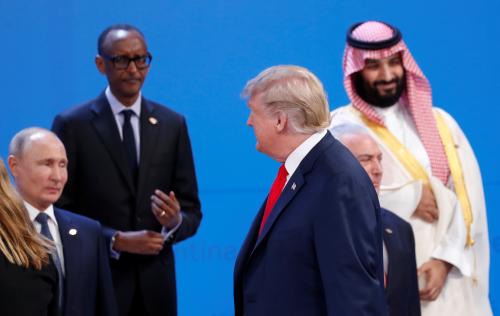
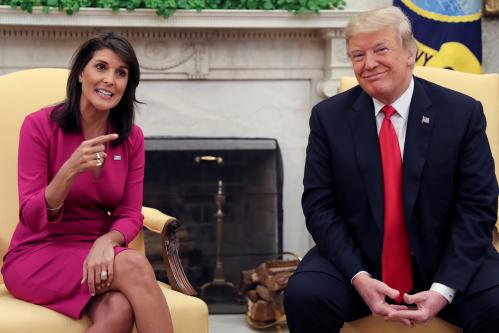
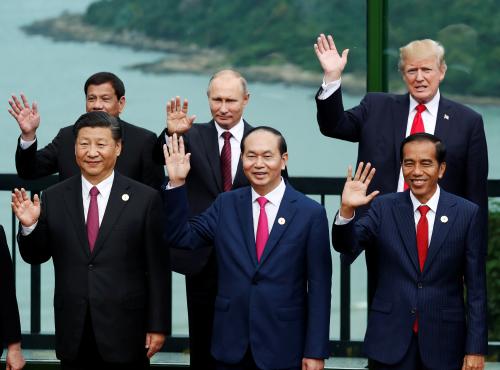

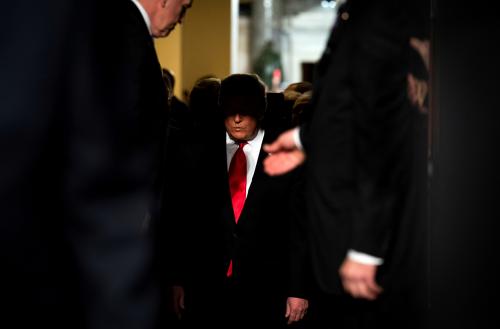
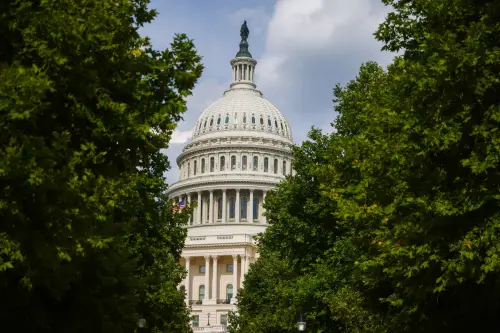
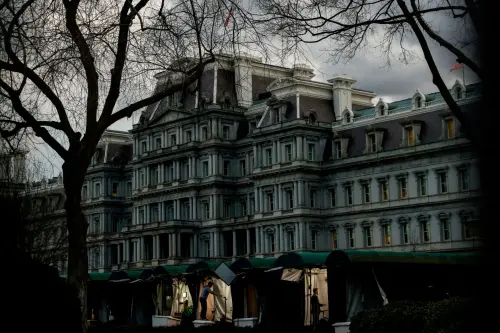
Commentary
Democrats need to place China at the center of their foreign policy
May 15, 2019